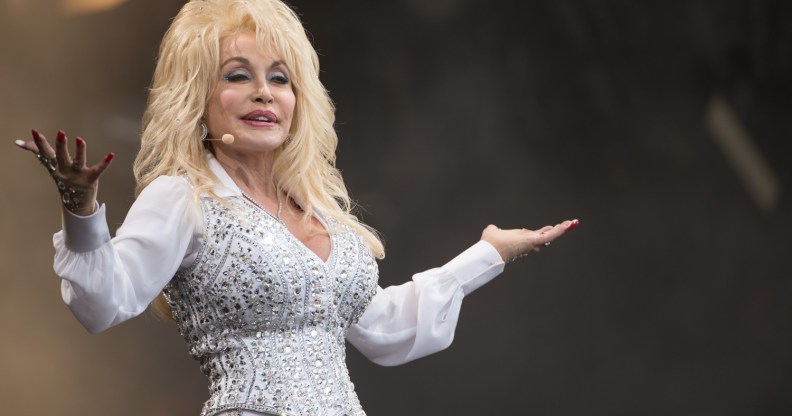‘Saint’ Dolly Parton part-funded Moderna’s promising new coronavirus vaccine

Dolly Parton. (Ian Gavan/Getty)
In the cosmic balance of the universe, Dolly Parton has long been a force for good: Gifting the world with her award-winning music and philanthropy, and now a vaccine for a virus that has paralysed the world and killed 1.2 million people.
Moderna Therapeutics became the second company to report promising preliminary reports from a large trial testing a coronavirus vaccine on Monday (16 November).
For a world anxiously waiting for a morsel of positive news about the pandemic, early trial data from its large, continuing study showed that the Massachusetts-based drugmaker’s vaccine is 94.5 per cent effective.
And you can thank Parton for that.
Moderna’s efforts to clinch a vaccine were funded, in part, by the Dolly Parton COVID-19 Research Fund as part of the musician’s unwavering support for the Vanderbilt University Medical Center, according to an article published in the New England Journal of Medicine.
The centre was one of several key players and institutions in public health that have supported Moderna’s months-long bid to contain COVID-19.
As much as there are still months to go before the vaccine becomes widely available to the public – pending Food and Drug Administration-approval and a crucial peer-review – the news that the second potential vaccine was, of all people, partly-funded by Parton became a glimmer of hope on Twitter.
https://twitter.com/JonathanPKatz/status/1328360693880545281
DOLLY PARTON FOR SECRETARY OF HEALTH AND HUMAN SERVICES https://t.co/wPhAykOpGo
— daniel™️ (@danielsogay) November 17, 2020
We do not deserve @DollyParton. She is genuinely of the kindest, most caring human beings, using her (well-earned) fortune to help people in so many different ways. Never flaunting it. Just getting shit done, for the betterment of us all. https://t.co/07TaJY69Xl— Ben Jacobson (@bfjacobson) November 17, 2020
in this house we stan icons who believe in science 💅🏼 https://t.co/KtQc3I9TnK pic.twitter.com/suFSzBzHRl— ❀ (@audreytwooo) November 17, 2020
Saint Dolly of Parton https://t.co/9ZyiDRwtH7— Diamond Lil (@proseccoprin1) November 17, 2020
🎶 I’m begging of you please save my naaaaan 🎶 https://t.co/mN76bGeXSF
— Greg James (@gregjames) November 17, 2020
Dolly Parton is one of humanity's greatest treasures. https://t.co/L4AFfwW0yz— Dave Hogg ✨ (@stareagle) November 17, 2020
https://twitter.com/CourtneyEJacobs/status/1328490658441543680
OK, hold up. How and why is Dolly Parton partly-funding a coronavirus vaccine?
When the country music icon was involved in a car accident in 2013, she became friends with Vanderbilt University surgeon Naji Abumrad, according to The Daily Beast.
At the start of the coronavirus pandemic, Abumrad showed Parton the research the university was doing on antibodies to combat COVID-19, and she wanted to help.
She went onto donate a million dollars to the Vanderbilt Vaccine Center earlier this year, which is researching synthetic antibodies that could treat and even prevent the virus.

